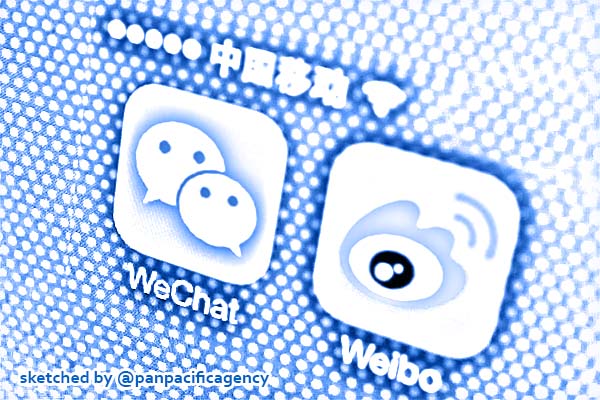Tencent’s WeChat app creates millions of new jobs in China’s digital economy: Report

Icons of WeChat and Weibo apps are seen on a smartphone in this picture illustration. Photo: Reuters. Sketched by the Pan Pacific Agency.
HONG KONG, May 15, 2020, SCMP. China’s biggest messaging app WeChat helped create 29 million job opportunities last year and has since helped stabilise the country’s employment situation in the time of the coronavirus pandemic, a report released Thursday (May 14) showed, South China Morning Post reported.
In 2019, WeChat helped create 29 million jobs, including 26 million directly related to its ecosystem, the latter of which represented a 16 per cent increase from the year before.
Companies using WeChat’s platform and tools to work, hire, and communicate generated 3.62 million job opportunities, while WeChat’s in-app mini-program ecosystem created 5.36 million job opportunities last year, according to the report which was co-published by WeChat’s owner Tencent and the state-run China Academy for Information and Communications Technology.
“The popularisation of the app’s digital tools including its official accounts, mini-program, and payment services have greatly reduced the employment threshold and broken the space, time, and age restrictions of employment, enabling medium and small entrepreneurs to get started quickly and join the wave of the digital economy,” the report said.
Along with WeChat, China’s social media platforms such as microblogging site Weibo and Bytedance’s short video app Douyin are now widely used by businesses and brands to promote their services and reach more customers. As more Chinese businesses use social media platforms for advertising, new occupations are also generated.
In February, the Ministry of Human Resources and Social Security and the State Administration of Market Supervision jointly released 16 new occupations, including “all-media operator”, referring to people whose full-time job is to run businesses based on media, including internet-based platforms.
Starting out as a messaging app in 2011, WeChat has over the past several years built an ecosystem around social, payment, content, and enterprise and public services – generating multiple new occupations. According to career and social networking platform Maimai, new jobs related to WeChat include those in new media operations, mini-game and mini-program development, short video, and online advertising positions related to WeChat’s Moments timeline.
The use of WeChat and its enterprise version WeChat Work during the Covid-19 pandemic also helped companies stabilise employment and resume online work after lockdowns heavily impacted offline operations and the job market, according to the report. The report said 11.1 per cent of WeChat’s mini-program developers and 14.5 per cent of the platform’s service providers increased hiring, opening 597,000 new positions during the pandemic.
“Under the impact of the coronavirus pandemic, emerging business models represented by online medical service, live-streamed education, remote working, and online public service have displayed an explosive trend. The development of the digital economy has [hit] a fast forward button,” the report says.
Combined monthly active users on WeChat – which is known as Weixin in mainland China – were 1.2 billion, up 8.2 per cent from a year ago, according to the company’s latest earnings report.
Although WeChat has nearly saturated its growth potential in China in terms of the number of users, the app continues to diversify by introducing more government- and enterprise-facing services to stimulate growth.
The platform now has over 140,000 public official accounts and 45,000 mini-programs developed by local governments and state-owned departments, enabling citizens to communicate with authorities, make appointments and process payments through WeChat Wallet.
WeChat also worked with the Chinese government to introduce a health code service to help manage travel during the pandemic, and distributed free digital coupons to users to help stimulate domestic consumption.